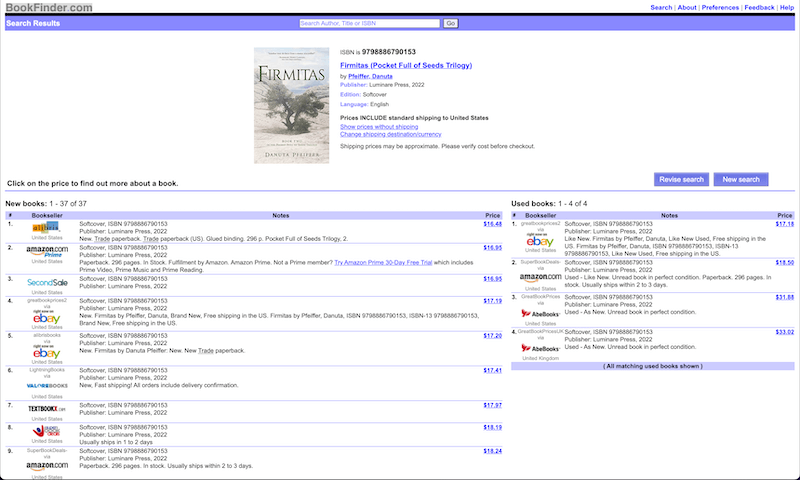Published: November 30, 2022
Are you ready to self-publish your book and wondering what to do about an ISBN?
If so, you’re not alone.
The conversations surrounding the purchase and use of the ISBN are some of the most confusing, not to mention opinionated, ones I hear. Authors wonder if they need one and how to get it. Opinions vary about the utility of free ones and of purchasing your own to maintain control of your book. In online forums, some writers will state that if you are an independent publisher, you must buy your own ISBN, and present this as a non-negotiable reality of self-publishing.
In short, there are a lot of questions about what an ISBN is, what it does, how to obtain one, and why the ownership is important.

But like many things about independent publishing, there’s not a one-size-fits-all answer. Instead, there are a variety of approaches to using an ISBN, and your choices depend on your goals for your book and your distribution plans. In this post, I’m going to review the options and tell you what you need to know as you consider your publishing options.
Let’s start with a definition
ISBN stands for International Standard Book Number and is a system for numbering and identifying books. ISBNs are assigned to books and are recognized world-wide. They allow retailers to find and identify your title, author name, type of book (hardback, paperback) and buy it so they can make it available for sale.
Why do you need an ISBN?
Your book will need an ISBN if you want to sell it in bookstores, whether brick-and-mortar or online retailers, or make it available to libraries. The ISBN will pertain ONLY to one book or edition. The hardcover, e-book, second editions, etc., will all have their own unique ISBN, even if they have the same title and content. You cannot reuse an ISBN, once assigned to a book, and if you republish your book, you will need a new number.
ISBN lookup
While readers usually search for books using the title or the author’s name, all retailers find books using the ISBN. You can look up any book by its ISBN using services like ISBN Search or BookFinder.com
Here is what you’d see if you look up: 9798886790153

You can also use the ISBN to search for a book on Amazon, Bookshop, or most retailers. The advantage of using the ISBN is being sure you’ll get that specific edition.
ISBN and Copyright
The ISBN has nothing to do with the copyright or the ownership of the work; the person who supplies the ISBN does NOT have the rights to the book. It is also not connected to the Library of Congress cataloging. You obtain the copyright of your book through the US copyright office (copyright.gov) and obtain a Library of Congress number, which allows librarians to catalog your book, at LOC.gov.
ISBN and publishers
An ISBN is simply a number that identifies the book and who published it. Whoever supplies the ISBN is technically the publisher.
So, for instance, if you sell your book to a traditional publisher, like Random House, they will supply the ISBN and be listed as the publisher. You will have the copyright under your name, but Random House will have the publishing rights, under whatever terms your contract specifies.
If you self-publish, it gets a little more complicated. There are several options for getting an ISBN, and you need to understand how each will affect your book distribution.
- You can get a free ISBN through companies that print and distribute books (KDP or IngramSpark, for instance.)
- You can purchase your own ISBN from Bowker (in the US, other countries listed below)
- You can get one from a hybrid company (Luminare Press, for instance) as part of your publishing package.
Let’s break each of those options down.
- Get a free ISBN through KDP or Ingram
First-time authors are often tempted to save money by taking advantage of a free ISBN offered by KDP or IngramSpark, but this is a place where it’s really not a saving. It’s a convenience that KDP and IngramSpark offer to make it easier for you to use their services exclusively. An ISBN provided by either of these companies will limit your distribution options, and whoever supplied the ISBN for free will be listed as the publisher on the copyright page. KDP uses Independently Published and IngramSpark uses Indy Pub as their imprints.
Seeing those names on the copyright page or in the online book details is a dead giveaway that you haven’t published professionally, and while your friends and family might not care, booksellers will.
A free ISBN is not a great option for most self-publishers. The limited distribution options and the exposure as a likely amateurish production are reasons some authors insist that you must purchase your own. We agree that it’s a good idea to avoid these unless you only want to purchase copies for your own use, and not distribute your book through retailers. - Purchase your own ISBN number or numbers
You can also buy your own ISBNs through Bowker if you’re in the US. (For a list of the entities that offer them in your country see the link below.) When you buy your own ISBN, you can publish under whatever name you choose; you are essentially claiming your own publishing name, and you will use the name to register your ISBN. That will be the name that goes on the copyright page.
This might be a great option if you are branding a book as part of a business strategy. For instance, you run MM Consulting and you’re writing a book about leadership that you would like to make available to potential clients, using MM Press adds another layer to your business branding. You will have to put your Imprint name (MM Press) and address on the copyright page.
It also might work well if you are a prolific writer of serial books and you are developing an author brand. In that case, your publishing name would be part of your branding as an author.
You can buy a single ISBN through Bowker for 125.00 or ten for $295.00. Generally, it’s a good idea to buy a block and have one for an e-book or hardcover edition. Be aware though, that the number of ISBNs you purchase is reflected in the numbering arrangement. In other words, if you buy just one or a block of ten, anyone who knows the ISBN numbering system will recognize that you are working on your own. It’s a small detail, and for most people, it won’t be an issue, but if you are trying to disguise the fact that you have self-published, it can give you away - Get an ISBN through a hybrid company
Many hybrid publishers (including Luminare Press) offer an ISBN as part of their publishing package, or they can provide one for an additional fee (usually less than a single ISBN would cost through Bowker.) If this is the case, the hybrid publisher will be listed on the copyright page. As with free ISBNs, though, it could restrict your distribution options, depending on the terms of your contract and how your publishing accounts are set up. Some companies, for instance, will provide you with an ISBN, but only allow you to distribute through their preferred distribution avenues. You could not, for instance, use most hybrid companies’ ISBN to publish the book on your own through KDP or IngramSpark.
However, if you work with a company like Luminare Press, you receive an ISBN as part of your publishing package. Since we supply an ISBN, we take care of the work of registering and tracking your number, but it does not confer any ownership of book rights to us. You are already setting up your own publishing accounts with KDP and IngramSpark, so the ownership of the ISBN is not as big an issue – for instance, if an author wants to do an off-set print run, rather than POD, they could use the same ISBN. However, if you decided to republish the book using a different publisher, or were picked up by a traditional publisher, the new publisher would supply the ISBN.
A quick word about Imprint vs. Publisher
An additional point of confusion is between the word “Imprint” and “publisher.” Generally, they can be used interchangeably, but there is a difference in publishing hierarchy. An imprint can be a division of a publishing company, used for branding certain types of books. For instance, the big five publishers have many imprints – perhaps one for classics, one for romance and other fiction genres, one for non-fiction books. Luminare Press has several imprints because different books fit different categories. If you are a sole publisher, your publishing name and imprint are probably the same
In conclusion
- If you are publishing for family and friends only and are not concerned about wide distribution for your book, a free ISBN from KDP or IngramSpark would be an economical choice.
- If you are an established business or plan on publishing multiple books and branding a publishing name as part of your marketing strategy, buying a block of ISBNs might be a very good solution.
- If you are working with a hybrid publisher, and they offer an ISBN as part of their package, understand what that means in terms of distribution and royalty payment. Check the terms of your contract carefully or discuss with your representative whether or not the ISBN restricts your distribution to certain channels.
Where to purchase ISBNs
Bowker is the governing agency for the United States. Remember that while ISBNs are issued locally (each country has its own agency), they are recognized worldwide. This means that if you publish a book in the U.S. and you want to distribute it in the U.K. you don’t need to buy a new ISBN (as long as the book edition is the same). Also, if you translate your book into a foreign language, you will need a new ISBN because the translated book would be a new edition, but you can still use an ISBN bought through Bowker.
Links:
- United States: Bowker Identifier Services: https://www.myidentifiers.com/
- List of Agencies outside the United States: https://www.isbn-international.org/content/where-get-isbn
The video in this article is part of our Self-Publishing Class. The full class is also included for authors who choose the Essentials Design Pack.